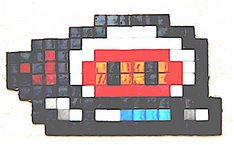Forget "making available" some songs on a P2P network—in the UK, blaring your radio too loud might make you a target for a multi-hundred-thousand-pound lawsuit for copyright infringement. The UK-based Performing Rights Society—a group that collects royalties for publishers, songwriters, and composers—has accused a car repair chain named Kwik-Fit of copyright infringement because mechanics were regularly found to play their radios loud enough for others to overhear the music
The PRS claims that it has logged over 250 incidents of Kwik-Fit employees audibly playing music since 2005. "The key point to note, it was said, was that the findings on each occasion were the same with music audibly 'blaring' from employee's radios in such circumstances that the defenders' [Kwik-Fit] local and central management could not have failed to be aware of what was going on," the judge in the case, Lord Emslie, told the BBC. "The allegations are of a widespread and consistent picture emerging over many years whereby routine copyright infringement in the workplace was, or inferentially must have been, known to and 'authorised' or 'permitted' by local and central management."
The PRS insists that the fact that the music can be heard by others amounts to a "performance" of the music in public—something that is not allowed unless the business has the proper licenses to do so. Such a license would cost Kwik-Fit roughly £30,000 per year, the PRS told The Scotsman in June. When multiplied by the number of years that the business has allegedly been violating copyrights, the PRS says that £200,000 would make a reasonable sum.
In the UK, any business that broadcasts music—even if it's commercial, publicly-accessible radio—must obtain a license to do so, according to the MCPS-PRS web site. Of course, customers who accidentally overhear the radio being played by a Kwik-Fit mechanic could just as easily go home and turn on the same radio station within the bounds of British copyright laws. Conversely, the American Society of Composers, Authors, and Publishers allows businesses to play publicly-accessible radio or TV as long as the transmission is being received by a single unit (and not broadcast from room-to-room) and there is no admission charge to enter the establishment. In other words, the mechanics' actions would be permissible in the US, but not in the UK.
But what's at stake is not just Kwik-Fit's official policy on broadcasting music (in fact, the company says that it has a 10-year policy outlawing radios at the workplace), but whether employees at any company can play music aloud. What about office employees that play music in a shared office or a cubicle farm? Even at relatively low volumes, someone is inevitably going to hear what is being played in a close working environment. At what point is it no longer acceptable for an individual to play music out loud, with the fear that someone else might hear it in passing?
Kwik-Fit asked the court to dismiss the suit at a procedural hearing last week, citing its official, anti-radio policy. The judge refused to dismiss the £200,000 claim, however, saying that there was at least enough evidence such that the case should be heard. He made clear, however, that his allowance of the suit did not necessarily mean that he felt the PRS would succeed.
Monday, October 15, 2007
Subscribe to:
Post Comments (Atom)

No comments:
Post a Comment